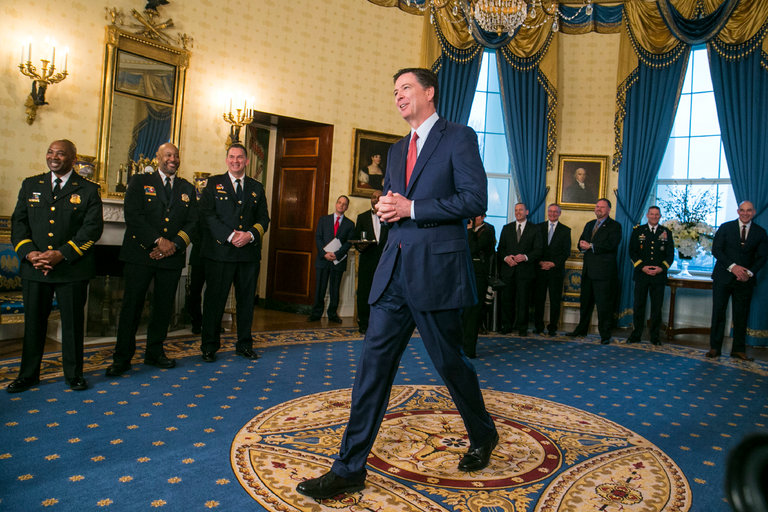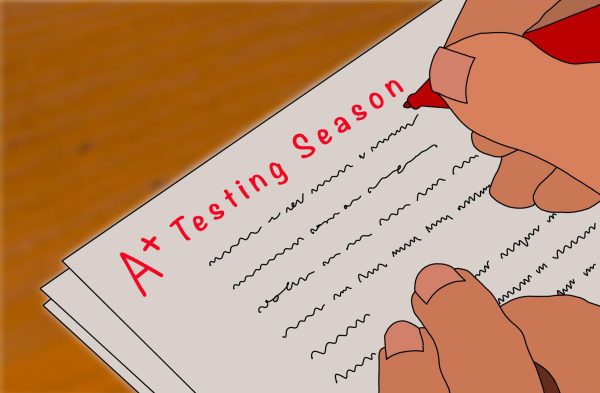The Comey Controversy
President Trump fired FBI Director James Comey, enraging Democrats and Republicans alike.
The system of checks and balances embedded in the United States Constitution seeks to ensure that not one person, not even the President, is above the rule of law. This system has thus far been relatively effective in preventing any one individual from retaining disproportionate power. On May 9, this system failed when President Trump fired James Comey, the director of the FBI and leading investigator into allegations of possible collusion between the Trump campaign and Russia. The White House cites Mr. Comey’s mishandling of Hillary Clinton’s e-mail scandal as the reason for his termination, despite the fact that both Attorney General Jeff Sessions and President Trump previously lauded the actions of the FBI Director. If this truly was the reason for firing Mr. Comey, it leads us to pose the question: Why now?
The answer lies in the testy relationship between President Trump and the Department of Justice. During the 2016 Presidential campaign, Comey was the lead investigator behind the Clinton e-mail scandal and many Democrats blame his mishandling of the case as the reason behind the Republican win. Both Sessions and Trump, however, commended Comey for his transparency in releasing information damaging to the Clinton campaign. Now, months later, both the Deputy Attorney General Rod Rosenstein and Attorney General Jeff Sessions cite the mishandling of the investigation as the reason for which they recommended the President fire Comey. Rod Rosenstein has officially said that Comey treated Clinton “unfairly” and thus “damaged the credibility” of the entire Justice Department, yet when it meant getting ahead in the polls, neither Sessions nor Trump seemed to be concerned with the way in which Clinton was being treated.
While this may be the “official” reason for the termination, the timing suggests that it is a thinly veiled attempt to impede the FBI in their investigation into Mr. Trump’s associates. This is further confirmed by the differing versions of the story that have come out of the White House. Originally, Sean Spicer insisted that the President merely “accepted the recommendation”, but a few days later Trump directly contradicted what the White House said by stating that he was going to fire Comey, regardless of the suggestions from Sessions and Rosenstein. A third story that has surfaced is that Rosenstein knew Trump was intent on firing Comey prior to writing the memo detailing that what he says was a suggestion to the President. The inability of the White House to effectively communicate with the President in order to deliver a coherent and truthful story to the American people further jeopardizes the credibility of the institution, and confirms that President Trump fired the Director for reasons other than those expressed by Rosenstein and Sessions.
“The White House and the President should definitely get their stories straight and be honest about this and everything going on currently surrounding the Administration,” junior Lior Colina said.
The termination of Comey as Director of the FBI could potentially derail the investigation into possible collusion between Mr. Trump’s campaign and Russian operatives, something which would greatly benefit the President, and relieve “great pressure” on him, as Trump himself stated in a meeting in the Oval Office with Russia’s foreign minister and the Russian ambassador to the United States, the day after firing Comey. According to documents summarizing the meeting, President Trump reinforced the notion that he fired Comey primarily due to the Bureau’s investigation into his campaign by stating “I faced great pressure because of Russia. That’s taken off”. In ten words, the President confirmed that the firing of the FBI director had little to do with the handling of the Clinton case, and much to do with finding a way to halt the investigation. This is a clear violation of the rule of law, and a textbook example of obstruction of justice-which is grounds for impeachment. The President of the United States should not have the ability to meddle in any investigations, especially one that involves his campaign and is a matter of national security and protecting American democracy. Once this power is given to the President, it offsets the entire system of checks and balances that our forefathers sought so hard to protect.

This is the single most prominent example of corruption since Nixon fired the prosecutor behind the Watergate scandal. Mr. Comey was overseeing an investigation which was damaging to Trump and his people, he got close to something, so he got fired.
— sophomore Nikita Leus-Oliva
Since the President accepted the recommendation of the Deputy Attorney General and Attorney General to fire Comey, news outlets have bombarded Americans with a frenzy of breaking news reports, most of which have come as a result of this unprecedented action. Most concerning were the reports by the New York Times surrounding the tumultuous relationship that President Trump and Comey seem to have had. Comey is said to have distanced himself from the White House after having felt “unsettled by Trump”, who reportedly asked the FBI Director to pledge his loyalty to him, and, according to a memo by Comey, asked him to shut down an investigation into Michael T. Flynn-Mr. Trump’s former national security adviser. If the information in the memo is found to be true, this serves as yet another example of obstruction of justice, and it could cost Trump his presidency. While it is understandable for a President to make some mistakes, the American people, especially his most loyal supporters, must be able to draw a line between trivial mistakes, and flat out abuse of power. This line is what defines this country’s democracy. If Mr. Trump is able to repeatedly cross it, what does this say about American democracy? This line between a non-traditional presidency and acts that obstruct justice and are an overexertion of power must be reinforced, in order to remind the President that he is not above the law, and he will be held responsible for his actions-especially when they threaten the foundation of American democracy and national security.
While it may be premature to accuse President Trump of having committed a crime, the very nature of the termination of Comey suggests that there is something more than meets the eye. These incidents stir memories of the Nixon era, who like Trump, ordered the firing of the man who was investigating him in what is now referred to as the Saturday Night Massacre. The term Watergate is one that reverberates even today, for the devastating effects it had on the morale of the American people. A President should be a person who aims to be respected and admired for their honesty, and willingness to put the interests of the country above their own. It is imperative then, that Mr. Trump remember, that as Watergate reminds us, not even Presidents are above the law, and he should, therefore, ensure the American people that he is telling the truth and his intentions in firing the FBI Director were pure and in the best interest of the country as a whole, rather than an effort to impede an investigation into collusion with Russian officials.
Your donation will support the student journalists of Coral Gables Senior High School. Your contribution will help us cover our annual website hosting costs.

Natalia,“Nati”, Torres is a senior in the International Baccalaureate (IB) program and is very excited to continue at Gables as part of the CavsConnect...















